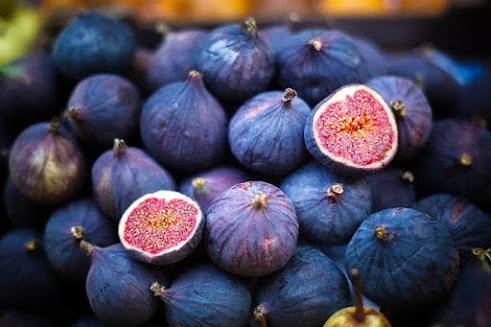Figs are as unique fruits as tears. They are the size of a thumb and are filled with hundreds of tiny pellets with an edible purple or green shell. The pulp is pink and has a sweet taste. The scientific name of figs is Ficus altissima. Figs and their leaves are rich in nutrients and have numerous health benefits. These foods support healthy digestion, reduce the risk of heart disease, and help control blood sugar levels. The fig is a soft fruit with a thin skin that can be green or purple in color. The flesh of the figs is typically red and the whole fruit is edible.
Nutrition :
100gm fig fruit contain :
- Calories : 74kcal
- Carbs : 8 g
- Fiber : 2.9 g
- Sugar : 16.26g
Vitamin & Minerals :
- Copper
- Calcium
- Iron
- Phosphorus
- Magnessium
- Potassium
- Folate
- Vitamin C
- Vitamin A
- Riboflavin
- Thiamin
- Vitamin B6
- Vitamin K
Benefits :
Promote Digestive Health :
Figs have long been used as a home remedy or as an alternative treatment for digestive problems like constipation. They contain fiber, which can help promote digestive health by softening and increasing the volume of stools, reducing constipation, and serving as a prebiotic - or a food source for the healthy bacteria that inhabit the gut. In animal studies, fig fruit extract or paste helped to speed up the flow of food through the gastrointestinal tract, reducing constipation and easing the symptoms of digestive disorders such as ulcerative colitis. A study of 150 people with Irritable Bowel Syndrome (IBS-C) found that people who consumed about 4 dried figs (45 grams) twice daily experienced significant reductions in symptoms - including pain, bloating, and constipation - compared to control group. A similar study in 80 people found that supplementing with about 300 grams of fig fruit paste a day for 8 weeks significantly reduced constipation compared to the control group.It May Improve Vascular & Heart Health :
Figs can improve blood pressure and blood fat levels, which can help Improve vascular health and reduce the risk of heart disease. One study found that fig extract lowers blood pressure in rats with normal blood pressure as well as those with elevated levels. Animal studies have also shownimprovements in total cholesterol, HDL (good) cholesterol, and triglycerides after supplementation with fig leaf extract, but in a 5-week study of 83 people with high levels of LDL (bad) cholesterol, researchers noticed that people who daily they added about 14 dried figs (120 grams) to their diet, they had no change in blood fat levels compared to the control group. More human research is needed to better understand the link between figs and heart health.
May Help Control Blood Sugar :
One dated 1998 study in 10 people with type 1 diabetes found that consuming fig leaf tea with breakfast could lower insulin requirements. In the month they received their fig leaf tea, insulin doses dropped by about 12%. Moreover, a more recent study found that drinks containing high doses of fig fruit extract had a lower glycemic index (GI) than drinks without fig fruit extract, meaning these drinks will have a more beneficial effect on blood sugar levels. However, fig fruits - especially dried figs - are high in sugar and can increase blood sugar levels in a short time. If you have problems controlling your blood sugar, you should limit your consumption of dried figs.
Potential Anti-Cancer Properties :
There have been many promising test-tube studies investigating the effects of fig leaves on cancer cells. Fig leaves and natural latex from fig plants have been shown to exhibit antitumor activity against human colon cancer, breast cancer, cervical cancer and liver cancer cells. However, this does not mean that eating figs or drinking fig leaf tea will have the same effects. Test-tube studies offer a promising starting point, but human studies are needed to evaluate how consuming figs or fig leaves affects cancer development.
May Promote Healthy Skin :
Figs can have beneficial effects on the skin, especially in people with allergic dermatitis - or dry, itchy skin from an allergy. One study in 45 children with dermatitis found that a dried fig extract cream applied twice a day for 2 weeks was more effective at treating the symptoms of dermatitis than standard hydrocortisone cream. Moreover, in a test tube and animal studies, a combination of fruit extracts - including fig extract - has been shown to have antioxidant effects on skin cells, reduces collagen breakdown and improves the appearance of wrinkles. positive effects came from the fig extract or one of the other extracts tested. More research is needed to determine the effects of figs on skin health.




